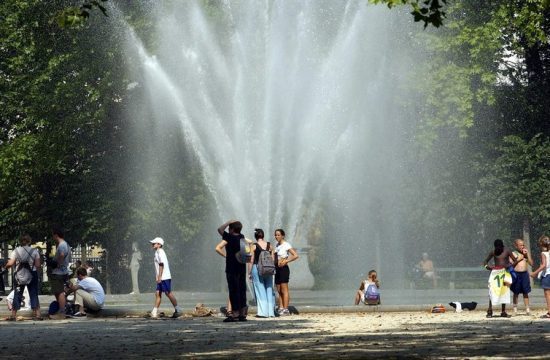The United Nations climate change conference held last year in Paris had the aim of tackling future climate change. After the deadlocks and weak measures that arose at previous meetings, such as Copenhagen in 2009, the Paris summit was different. The resulting Paris Agreementcommitted to:
Holding the increase in the global average temperature to well below 2°C above pre-industrial levels and to pursue efforts to limit the temperature increase to 1.5°C above pre-industrial levels, recognising that this would significantly reduce the risks and impacts of climate change.
The agreement was widely met with cautious optimism. Certainly, some of the media were pleased with the outcome while acknowledging the deal’s limitations.
Many climate scientists were pleased to see a more ambitious target being pursued, but what many people fail to realise is that actually staying within a 1.5℃ global warming limit is nigh on impossible.
There seems to be a strong disconnect between what the public and climate scientists think is achievable. The problem is not helped by the media’s apparent reluctance to treat it as a true crisis.
The 1.5℃ limit is nearly impossible
In 2015, we saw global average temperatures a little over 1℃ above pre-industrial levels, and 2016 will very likely be even hotter. In February and March of this year, temperatures were 1.38℃ above pre-industrial averages.
Admittedly, these are individual months and years with a strong El Niñoinfluence (which makes global temperatures more likely to be warmer), but the point is we’re already well on track to reach 1.5℃ pretty soon.
So when will we actually reach 1.5℃ of global warming?

On our current emissions trajectory we will likely reach 1.5℃ within the next couple of decades (2024 is our best estimate). The less ambitious 2℃ target would be surpassed not much later.
This means we probably have only about a decade before we break through the ambitious 1.5℃ global warming target agreed to by the world’s nations in Paris.
A University of Melbourne research group recently published these spiral graphs showing just how close we are getting to 1.5℃ warming. Realistically, we have very little time left to limit warming to 2℃, let alone 1.5℃.
This is especially true when you bear in mind that even if we stopped all greenhouse gas emissions right now, we would likely experience about another half-degree of warming as the oceans “catch up” with the atmosphere.
Parallels with climate change scepticism
The public seriously underestimates the level of consensus among climate scientists that human activities have caused the majority of global warming in recent history. Similarly, there appears to be a lack of public awareness about just how urgent the problem is.
Many people think we have plenty of time to act on climate change and that we can avoid the worst impacts by slowly and steadily reducing greenhouse gas emissions over the next few decades.
This is simply not the case. Rapid and drastic cuts to emissions are needed as soon as possible.
In conjunction, we must also urgently find ways to remove greenhouse gases already in the atmosphere. At present, this is not yet viable on a large scale.

Is 1.5℃ even enough to avoid “dangerous” climate change?
The 1.5℃ and 2℃ targets are designed to avoid the worst impacts of climate change. It’s certainly true that the more we warm the planet, the worse the impacts are likely to be. However, we are already experiencing dangerous consequences of climate change, with clear impacts on society and the environment.
For example, a recent study found that many of the excess deaths reported during the summer 2003 heatwave in Europe could be attributed to human-induced climate change.
Also, research has shown that the warm seas associated with the bleaching of the Great Barrier Reef in March 2016 would have been almost impossible without climate change.
Climate change is already increasing the frequency of extreme weather events, from heatwaves in Australia to heavy rainfall in Britain.
These events are just a taste of the effects of climate change. Worse is almost certainly set to come as we continue to warm the planet.
It’s highly unlikely we will achieve the targets set out in the Paris Agreement, but that doesn’t mean governments should give up. It is vital that we do as much as we can to limit global warming.
The more we do now, the less severe the impacts will be, regardless of targets. The simple take-home message is that immediate, drastic climate action will mean far fewer deaths and less environmental damage in the future.
Source: The Conversation. Reproduced with permission.










